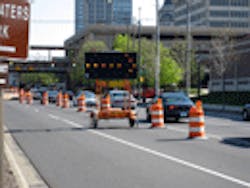Obama calls for $140 billion for infrastructure spending
In a speech before a joint session of Congress last night, President Barack Obama urged Republicans on Capitol Hill to push past partisanship and speedily pass his proposed $447-billion jobs-creation package of spending initiatives and tax cuts.
The proposal includes $140 billion in infrastructure spending and aid to states.
“The question is whether, in the face of an ongoing national crisis, we can stop the political circus and actually do something to help the economy,” the president argued. According to The White House, the plan consists of about $253 billion in tax cuts and $194 billion in federal spending—most of which will be spent in 2012.
The infrastructure portion of the plan includes a $50-billion program of “immediate” investments in highways, transit, rail and aviation, which the Administration said would put hundreds of thousands of construction workers back to work. The president also called for $10 billion to capitalize a “national infrastructure bank,” which would invest in a “broad range of infrastructure projects of national and regional significance, without earmarks or traditional political influence,” stated The White House.
Also proposed is a “deficit reducing plan to deploy high-speed wireless services to at least 98% of Americans, including those in more remote rural communities.”
But the key measure the president urged Congress to pass is the $240-billion cut in federal payroll taxes on employees and employers. As for paying for his Jobs Act, the president stated that it will be fully paid for by spending cuts in future years once the economy is fully restored.
Other measures in the package include spending over $62 billion to extend unemployment insurance benefits through 2012 and funding to attack long-term joblessness.
The payroll-tax breaks amount to more than half of the plan’s total cost yet is the measure political experts feel holds the most appeal for Republicans and thus is likely to be passed. Indeed, Speaker of the House John Boehner (R-OH) signaled a willingness to compromise, stating after the speech that, “The proposals the president outlined tonight merit consideration… It’s my hope that we can work together.”
Reaction ahead of the speech by trucking’s top lobby called for the administration to be abundantly clear on its intentions for infrastructure spending. American Trucking Assns. (ATA) president & CEO Bill Graves said yesterday that “concrete proposals” are needed with clearly identified sources of revenue and “not more vague commitments.”
According to Graves, the president needed to do “more than pay lip service to our nation’s critical need for more jobs and better roads and bridges. For months all we’ve heard from the president, as well as members of Congress, is ambiguous calls for more infrastructure spending without clearly and simply explaining how much is more and where those funds are to come from.
“This country needs Congress to make a decision on how to pay for our roads and bridges, and by simply expressing support for the idea of infrastructure without laying out details, the president and Congress are abdicating their responsibilities,” he stated. “No matter what the president proposes tonight, Americans deserve to be given details about how much money he wants to spend and what he wants to spend it on.”
Graves also argued against what he calls the “siren song” of infrastructure banks or public-private partnerships rather than “stable and reliable sources” of funding.
“Study after study, including one by the Dept. of Transportation’s own Inspector General, has shown that private-sector solutions to our infrastructure act as an additional tax on Americans with no benefits to users,” he declared. “Any private-sector entity investing in infrastructure is going to be looking for a return on its investment and payments to the private sector will take money out of travelers’ pockets and put it into portfolios rather than pavement.
“For nearly 60 years,” Graves added, “we’ve paid for our roads and bridges through the federal fuel tax and we strongly believe that policymakers should be honest about that tax’s ability to continue to fund our investment and increase it to the necessary levels.”
The U.S. Chamber of Commerce, back on Sept. 5, issued an open letter to both the president and Congress that lays out its own six-point jobs-creation proposal—the third point of which is to “speed up infrastructure projects.”
Specifically, the Chamber urged that just “reauthorizing the surface transportation, aviation, and water resources programs—using, in part, revenues already coming in from user fees—would enable states
and communities to plan projects, hire employees, and prevent devastating layoffs of existing workers.”
In addition, the Chamber pointed out that it has identified 351 “energy projects” projects that have been “sidetracked by government regulations, zoning restrictions, antigrowth advocates, and lawsuits. “Completing all of these projects could create 1.9-million jobs annually over seven years of construction and boost our national economy over time by $1.1 trillion.”
